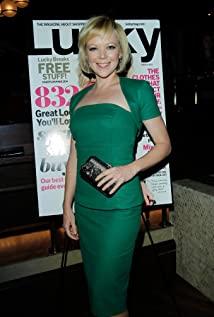It is rare to see the old man use a movie to set a monument to a person. "Anne Hall" kills two birds with one stone and achieves two classic roles; "Midnight Barcelona", the image of a man and a woman in a three-person relationship is vividly on the screen; "The Purple Rose of Cairo" and "The End of the Match" have won Woody's own favorite, but the protagonist's performance cannot be called a standout in any case; as for "Sex Collection", "Everyone Says I Love You" and "Love Is "Rome" is a hodgepodge of these stories, not to mention.
During the whole process of watching the movie, I was looking for clues of the author's pity. I think this is most evident in the atmosphere of Jasmine’s sprinting diplomat’s wife: when the fiance took her to buy a diamond ring and was caught by Ginger’s ex-boyfriend Augie at the door of the store, and instantly returned to her original shape. , Everyone took a deep breath, and the feeling was probably "Fuck! Just a little bit!" Some people think that this is due to Blanchett's appearance. I don't think so: In this film, she Her makeup is snobbish and mean, it is hard to imagine that this is the cold-tempered heroine in "Rejuvenation" and "The Tower of Babel". Even so, we still blame Woody for being too unsympathetic when she saw her chanting "Blue Moon" at the end of the play, and she looked desperate. As everyone knows, the emotion of the audience hovering between disgust and sympathy is exactly what the author intended. His approach in this work is a bit imitating the masters of critical realism in history. A breakthrough.
At the beginning, Woody couldn't wait to take her skin off: sitting in the first-class cabin, calling herself an anthropologist, she turned out to be a rumorous woman who was broke and her husband was a liar, and finally committed suicide in prison. Going back in time and uncovering the truth of her "fallen" bit by bit, we saw this pretentious, well-dressed woman, pretending to be ignorant of her husband’s love affairs, waited until her husband fell in love with Xiaosan and divorced her. Dazzle your head and kill your relatives righteously. In the film, Ginger and her two boyfriends are entangled in a question: her husband lied Augie and Ginger 200,000 yuan, did Jasmine know about it? From the point of view of her report, she was fully aware of it, and psychologically, it made perfect sense: she would never want to promote her sister to her own social class, not only because of her younger sister and younger sister. Her boyfriend is embarrassing to her, and if there is no reference frame of wealth and poverty, wouldn't it lose half of the meaning of wealth? Every year when the class reunion is held, the most active people are the people who have been mixed up. For them, if they can't show off, what good is it for them? Vanity is one of the driving forces of human progress.
So I said, this movie is an authentic story of capitalism, just like Thackeray's "Vanity Fair" and Balzac's "Comedy on Earth", shining with radical criticism. But if Woody stays at criticizing Jasmine's vanity, it will only reach the level of Maupassant's "Necklace" (I am not saying that "Necklace" is not good, but after all, it is a short story with limited capacity). The unique thing about this play is its polyphonic narrative. In the narrative on the other side, we are slowly developing a bizarre affection for Jasmine.
Yes, after the fall, Jasmine still can't change her vanity. She has been ransacked, but she still wants to take first class. She lives in Ginger’s house, but still looks down on her. She persuades Ginger to leave Chili. It doesn’t matter even if she climbs on a potbellied bald man. The most shameful thing is that she tried to seduce her at a party. The diplomat who came across, left the terrible environment, did not hesitate to lie, fabricate his career, and conceal the truth about the death of his husband.
Some people will definitely interpret this polyphonic narrative as a double criticism, but from some subtle details (except the one mentioned in the third paragraph), I can see that Woody feels a little bit compassionate towards her. After getting into trouble, Jasmine tried every means to go out. She was not in the mood to enjoy her life with her sister’s friends. She went to work during the day, and made up for the computer at night and on weekends. She also learned computer to take interior design courses online. Above, if the diplomat did not show up, she would follow this path of counterattack. Woody might want to say that this is the life she "deserves" and everyone should live a good life on their own hands.
Last time I watched an interview with a peripheral female, a female said: "Some things are not what I deserve, but I want them, can't they?" I think this should be Jasmine facing Woody. The cry of time.
In ancient Greek ethics, the concept of "desert" is closely related to "virtue" or "excellence". To put it bluntly, the amount a person deserves should be proportional to his virtue or excellence. The emergence of capitalism is a subversion of this formula: it is not your virtue or excellence that determines how much you deserve, but how much you get, which determines how much your virtue or excellence is. If you can't make money, it means you have no ability, no need to explain, thank you. "Deserve" disappeared in the new formula, but it still remains in our language, so our reality is separated from what we should be: we say that a team deserves a championship because it has the best Team leader, players, training and combat strategy, but it sometimes loses; we say that a person should get an offer from a Fortune 500 company because he is impeccable in terms of GPA, club experience and social practice, but such a person Sometimes they still lose the election. So we say "this is not fair" and "this is not fair", but no one compensates the "deserved" subject. In modern society, the more entangled in the "deserved" people, the more painful they live.
Don't get me wrong, Jasmine is definitely not a person who is entangled in the "deserved". Although she feels that she is elegant and tasteful, and can arrange the life of the upper class to be upscale, she is very clear that the rich and prosperous life is not her. Deserved: She has never gone to college, doesn't even know how to use a computer, and has no ability to make money on her own. This is a capitalist story, but the heroine is not a typical capitalist personality. She is not so much struggling with "deserved" as she is struggling with "deserved". Since moving to Ginger's house, she has been thinking all the time that she does not belong here, and everything around her is not worthy of her, not worthy of her.
After she went to San Francisco, in addition to the diplomat, two gentlemen greeted her. The first one was Eddie, Chili's friend. Chili helped him pass a message saying that he wanted to ask her, and her voice of refusal was very unfriendly. This little man is unqualified in any of her requirements for men, and he actually thought she was going to study nursing. This was an insult to her. Does she look like a nurse? Whether to see him again in the future will be a question. The other man asked her to be the dentist at the front desk. In such an environment, a dentist is already a pretty good choice. I changed to another widow who fell into the family. There is such a well-qualified man who is crazy about himself. I can’t wait to get married (we think of the "Gone with the Wind" Scarlett). Jasmine didn’t choose him. Strictly speaking, she didn’t even glance at him. Not to mention the nerdy breath of his dress. For a woman like her, the trivial smell in his bones was also that she was in ten. You can smell it within meters. Afterwards, he was forcibly indecent to her, and she could no longer do it there.
The emergence of diplomats is a straw, the dawn of heaven seen from the bottom of hell.
The diplomat himself is not very good. Judging from the fact that he was dazzled in front of beauty, it is estimated that he is not an excellent diplomat. It is possible to be a member of Congress, but he will not have much future. Of course, he finally became so angry that he had no room for maneuver, indicating that he didn't like Jasmine much either. This encounter, which Jasmine tried his best to exaggerate, was nothing but a bargaining negotiation between the widowers and widows. Jasmine wants his wealth, wants him to bring her back to the upper class life, and what he likes is Jasmine's beauty and innocent life experience. Jasmine lied about the content of the contract, so he changed his mind before signing the contract. It was reasonable and reasonable. Diplomats are the moral model of capitalism.
It can be seen that from the beginning of the diplomat’s self-reporting of his family, Jasmine should have been thinking about how to modify her life experience. At that time, she had two strategic choices. The first is to be honest in the big place, and to conceal or lie in the small place. (For example, concealing the plot of reporting your husband). The advantage of this is that it can avoid the embarrassment of being exposed on the spot as in the scene. The disadvantage is that the risk is too great, and the diplomat is likely to run away after asking her for a favor; the other is her Practice in the play. To be fair, her choice is safer. The first bet is that the diplomat loves her (or her beauty) more than her reputation. The first bet is that the lie will not be exposed before marriage (you can slowly explain it after marriage, of course she will not Naive enough to think that it can be concealed for a lifetime), obviously the second one is more wise. The cruel Woody Allen is about to come to a "people are not as good as the sky", the dream is shattered, leaving only the blue dream bubble floating in our sight.
"This woman, isn't she making her up?"
On the face of it, she is indeed self-inflicted. Her superior life was destroyed by herself. If it were not for her to report it, she and her husband would divorce, and the property would be enough to live the rest of her life leisurely; if she chooses to tell the diplomat, even if he has a considerable amount of money Chances are not to accept him, but she has nothing to complain about, and at the same time, she can use this action to draw a clear line from her previous self. However, Woody is not going to use this movie to engage in moral judgment, nor is he going to tell a fable that leads people to good. What he wanted to say was rather the story of a less harmful Lady Macbeth, or the story of a female Faust in the vulgar age. The ambition of human beings to not succumb to the status quo, swelled to the extreme, can slaughter the country, kill people and set people on fire, but it is a sign that distinguishes us from the people around us when our ordinary lives are turbulent. How many people still think when they are hopeless, I am different from ordinary people, I still have dreams in my heart/I'm just having a genius/I haven't confessed my fate. Jasmine failed, but when Woody played "Blue Moon" for her at the end of the credits, I seemed to see a trace of pity on his wrinkled face.
In his early years, Woody was a leftist who loved to talk about things. His works were full of cynicism against the right wing. In the past ten years, there have been fewer talkers. He even played a role in "Love in Rome". An anti-communist. I don't know if this is artistic maturity or rational conservativeness, but his anti-ideological tendency can be said to have reached its peak in "Blue Jasmine". The complex structure of the film makes it difficult for some people to clarify what the author wants to express: on the one hand, he is mocking capitalism for allowing lustful liars and vain women to dominate, on the other hand, he blurs the boundaries between greed and self-motivated. The memories of the story let us. We become more and more disgusted with Jasmine, but the ongoing story makes us feel more sympathetic to her. The resulting mixed feelings are probably the feelings we should have for a person with flesh and blood, ambitions and fatal flaws, and it is also our feeling for a possibility. The feelings you deserve.
View more about Blue Jasmine reviews











